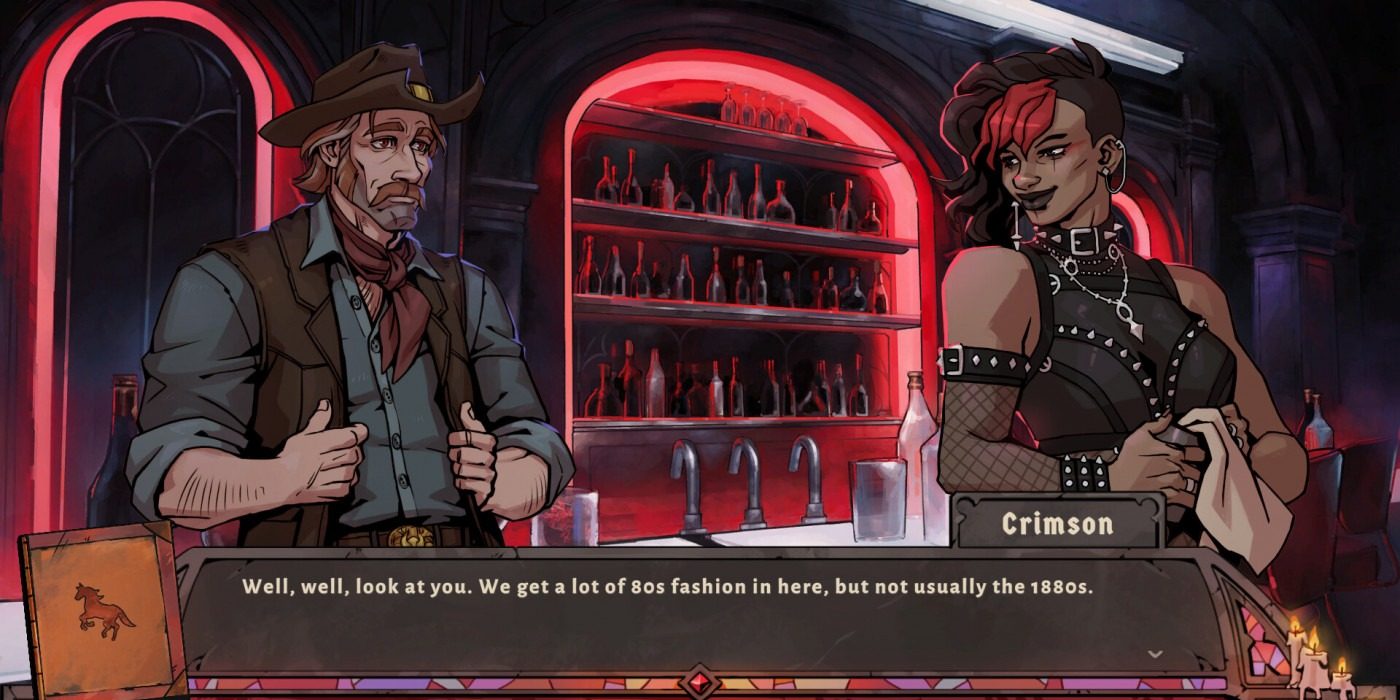Fangs and feelings: a review of Vampire Therapist
Whilst ‘vampires’, ‘cowboys’, and ‘therapy’ may not immediately spring to mind in any games of word association, Little Bat Games’s Vampire Therapist will leave you questioning why this eclectic list of topics has never been made into a joyous combination before. For a visual novel to strive for an accurate depiction of Cognitive Behavioural Therapy (CBT), whilst simultaneously providing all the lust, gore, and sensuality that any haunt loving vampire fiend could desire, sounds admittedly absurd. However, Vampire Therapist isn’t a game you’d regret sinking your teeth into.
Upon opening the Vampire Therapist, the player is greeted by a message explaining that the game was produced in consultation with licenced therapists, and isn’t long before this focus on proper, accurate and integral education begins to shine through. First, you are introduced to the player character, Sam Walls: a downtrodden, rough around the edges, ceaselessly empathetic vampire. Complete with a thick Southern American accent, cowboy hat, and supernaturally pale complexion, Sam endears almost immediately, musing about his goals of bringing emotional ease to vampire kind.
It is in this quest that the player is introduced to Andromachos, a wizened 3000-year-old undead, that much more embodies the hedonism and sexuality that have become increasingly common tropes of a contemporary vampire. Andromachos (or, as country bumpkin Sam dubs him, ‘Andy’) is the vessel for all the therapy knowledge that the game wields. In a long, but vampire pun infested, educational session, Andromachos provides Sam with five cognitive distortions ranging from those as complicated as ‘Nosferatu Thinking’, essentially meaning viewing the world in black and white, to ‘Labelling’, the act of branding oneself and others with names or, more simply, labels.
The ease with which Vampire Therapist is able to teach players about these rather complex foundations of CBT is nothing to smirk at, but this tutorial section, ridden with several examples that the player must match to the correlating cognitive distortion, does feel like rather a sludge to get through. Although high quality, in-depth writing is intrinsic to the genre of visual novels, there are times in which Vampire Therapist’s dialogue feels unnecessarily long, particularly in the heavy back-and-forth during the tutorial, with certain moments rewinding me back to some stale Psychology A-Level classroom discussions. This is not aided by the visuals, as whilst the art is undeniably striking, Sam feels incredibly static for a character that almost never leaves the screen, leaving the feeling that even three more poses would have gone a long way to make him feel more alive… in spite of his undeadness.
A perfectly playful, cozy visual novel
The game, however, really springs into action once you begin to meet your first few bloodsucking clients. Ranging from short-tempered Italian aristocrats to undyingly passionate thespians, the colourful cast of clients you encounter are the lifeblood of Vampire Therapist. It is in these clients that the incredible voice acting the game has to offer is best flaunted, with each voice offering all the pompous, overexaggerated vampiric action you could wish for. Sam, in particular, with his Western drawl and general cowboy gruffness, is voice acted brilliantly, with the Southern slang going a long way to make him an intriguing and appealing protagonist.
Irrespective of its dense tutorial, once you finally begin your consultations Vampire Therapist it is eager to ditch any handholding, dropping you straight into a session with nothing but your notes. Whilst Andromachos will occasionally telepathically beam in the event that you incorrectly diagnose a cognitive distortion. The progressive scaling up of difficulty of the game takes what could feel like a yawningly repetitive gameplay loop but then turns it into an engaging educational experience.
Indeed, it is in this education that I gathered the most value from Vampire Therapist, finding myself catching myself doing some ‘labelling’ of my own in the days after I started the game. Whilst the humour of the game is appealing, citing iconic comedies such as What We Do In The Shadows and Horrible Histories as inspiration, it is the exploration of genuine therapy techniques that truly makes this game unique.
Whilst there are times in which Vampire Therapist can feel static or a little lecture-like, overall, this is a perfectly playful, cozy visual novel to pick up when you’re in need of some quick and heartwarming Halloween haunts.
Disclaimer: A code for Vampire Therapist on PC was provided by the publisher in exchange for an honest review

Comments